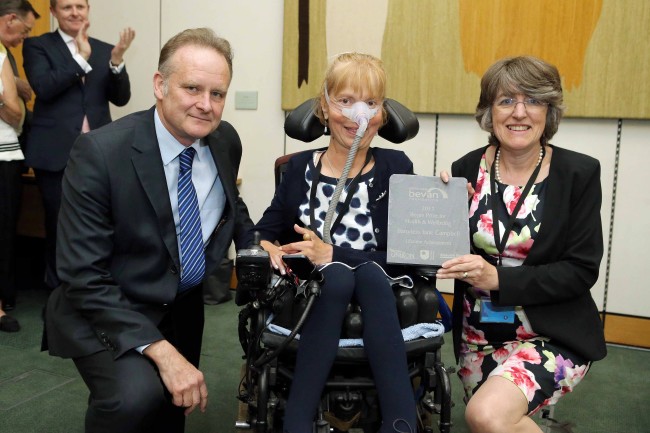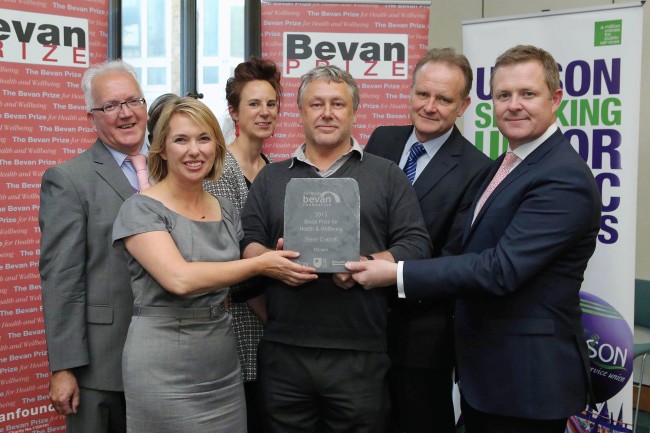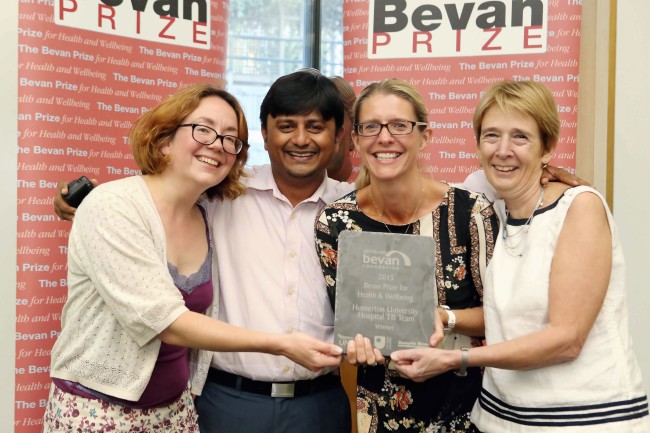 Subscribers Only
People
Subscribers Only
People 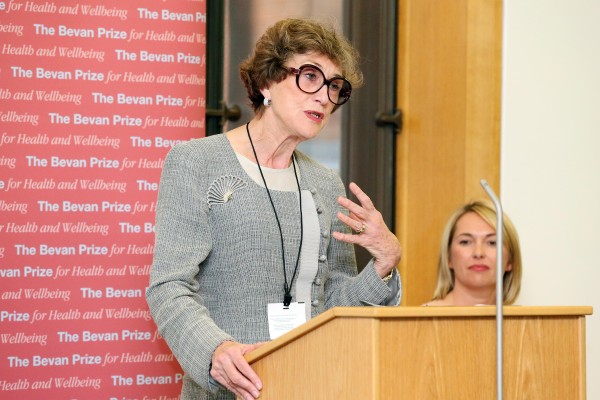
The third annual Bevan Prize for Health and Wellbeing was awarded on 7th July 2015 in Portcullis House, Westminster.
MPs, Peers, guests and nominees gathered to celebrate individuals and organisations who have made an outstanding contribution to the advancement of health and wellbeing in the UK, while championing the founding principles of the NHS.
The Lifetime Achievement award was given to Baroness Jane Campbell, while Homerton University’s TB Team and Steve Cottrell won the organisation and individual prizes respectively.
This year’s shortlist and winners were decided by a panel of judges made up of David Brindle (Public Services Editor, The Guardian); Baroness Finlay of Llandaff (President, BMA); and Jaselle Williams (Trustee, Bevan Foundation). Find out more about the judges here.
Click here to find out more about the 2013 and 2014 prize winners and nominees.
The Lifetime Achievement Prize
Baroness Jane Campbell
Baroness Jane Campbell was awarded the Lifetime Achievement Bevan Prize for her tireless campaigning to achieve equal rights for disabled people through legislation and positive action.
Originally from Kingston, Surrey, Baroness Campbell was diagnosed with the most severe forms of spinal muscular atrophy at the age of one.
After receiving a Master’s degree in political history, she sent of over 100 job applications and was eventually offered a role as a junior administrator at the Greater London Council. From this base she started Disability Equality Training courses, setting up the first national register of Disabled Equality Trainers who worked in Local Authorities throughout the country. She describes this as: “One of my proudest achievements as it empowered other disabled people to work and become successful in their own right at the same time as raising the awareness of disabled people’s right to equality in Public Services as administrations.”
Baroness Campbell went on to become Co-Chair and then Chair of the British Council of Disabled People and co-founder of the National Centre for Independent Living. Under her watch, these organisations championed independent living, civil rights, peer counselling and equal opportunities.
She said the passing of Disability Rights Act in 1995 and the Community Care Direct Payments Act, as a turning point in her career. She was given her first political appointment in 2006 as founding Chair of the Social Care Institute for Excellence, while simultaneously being appointed as a Commissioner on the Disability Rights Commission.
With a strong passion for politics but no allegiance to a particular political party, she successfully applied to be a crossbench member of the House of Lords. She said: “For the first time in my life I felt I did not have to prove my value to the world.”
She currently Co-Chairs the All Party Parliamentary Disability Group and has taken through her first Private Members Bill (Social Care Portability Bill) which was incorporated in the Care Act 2014. She has also led debates on the closure of independent Living Fund, and sits on the Equality Act 2010 and Disability Committee.
The Individual Prize
Steve Cottrell
Winner
Steve Cottrell is a mental health nurse based in North Wales who has developed several internet-based self-help programmes for people with stress, anxiety, phobias and panic attacks.
Beginning in 2002, Steve started sharing his ‘Outreach-Online’ progamme with his patients, and it went on to win the Welsh Innovations in Healthcare award in 2006. Since then, it has morphed and adapted into the Serenity Programme which currently has more than 80,000 users worldwide and draws in another 100 new users each day.
Steve said: “There are private companies with far greater resources than my own at their disposal, some of whom charge £100 per treatment. Why price an invention out of the reach of many users, or limit its deployment through ‘cost per case’ pricing, when the strength of the internet is the way in which it can help democratise healthcare? The Serenity Programme widens access to people who, by reason of choice, disability or lifestyle may not visit mental health premises or avail themselves of a service.
We now have an infrastructure, involving both the NHS and third sector, delivering the Programme to people with the early symptoms of stress, depression, or anxiety. Instantaneous machine translation converts the Programme into over 80 languages, while a ‘stepped’ approach enables people to access the low-intensity part of the Programme immediately with no login or personal details required.”
To find out more about Steve Cottrell’s work, please click here.
Elizabeth Blewett
Finalist
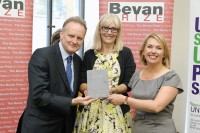 Elizabeth Blewett is the Chief Executive of Reaching Out East, a charity that supports over 1800 disabled and socially-isolated people living in the London Borough of Waltham Forest.
Elizabeth Blewett is the Chief Executive of Reaching Out East, a charity that supports over 1800 disabled and socially-isolated people living in the London Borough of Waltham Forest.
Elizabeth was nominated for the strategic direction she has given Reaching Out East, as well as the range of experience and hands-on approach she takes to her role. She has forged links with other organisations in the borough and has deep commitment to empowering people in whatever situation they find themselves in.
Some examples of Elizabeth’s work include a programme which has helped 320 isolated older people to develop practical solutions to the barriers they face to leading independent lives, as well as supporting a young mother with a very serious long term health condition to enable her to access a personal health budget.
Her colleague who nominated her said: “Elizabeth is a strong and fearless advocate for some of the most vulnerable people in the borough. What makes the above examples possible are Elizabeth’s empathy, commitment and honesty. Finally, Elizabeth’s character is one of being open to change and not seeking any personal credit for the work she does.”
More information about Reaching Out East is available here.
Dr Paul Edmondson-Jones
Finalist
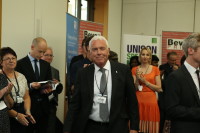 Dr Paul Edmondson-Jones is Director of Public Health at Redcar and Cleveland Borough Council, and was nominated for his work on the Healthy Living Pharmacy model. Through the model, he sought to improve overall health outcomes and foster a culture of wellbeing, while also reducing health inequalities.
Dr Paul Edmondson-Jones is Director of Public Health at Redcar and Cleveland Borough Council, and was nominated for his work on the Healthy Living Pharmacy model. Through the model, he sought to improve overall health outcomes and foster a culture of wellbeing, while also reducing health inequalities.
Dr Edmondson-Jones started developing the Healthy Living Pharmacy model while based at Portsmouth City Teaching Primary Care Trust. It is described as both a way to approach commissioning and a framework to ensure consistency of service delivery in community pharmacies.
The Healthy Living Pharmacy framework ensures that pharmacies meet local needs while improving the health and wellbeing of their community. Each pharmacy must also have at least one Health Champion (someone who has completed behaviour change and leadership development) and a dedicated health promotion zone.
The team who nominated Dr Edmondson-Jones said: “Evidence indicated that the results seen in Portsmouth could be replicated in other areas with differing demography and geography. The strength of the improvements was notable as, despite limitations of the evaluation and variation in service delivery and evaluation across areas, gains were seen for different services, with different specifications, in geographically varied areas with different levels of health need and deprivation.”
To date, there are over 1,000 Healthy Living Pharmacies and more than 3,000 Health Champions in the UK. The model was mentioned as a case study in both the NHS and the Public Health White Papers in 2010, and has been nominated for several national awards.
To read more about the Health Living Pharmacy, click here.
Michelle Farley
Finalist
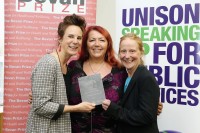 Michelle Farley founded Sexual Health on Call – a health and wellbeing programme for women sex workers – in 1997. While it offers the services that are provided by most sexual health clinics such as reproductive health advice and STI testing, Michelle’s programme is designed around a more holistic approach to meeting the health and wellbeing needs of sex workers.
Michelle Farley founded Sexual Health on Call – a health and wellbeing programme for women sex workers – in 1997. While it offers the services that are provided by most sexual health clinics such as reproductive health advice and STI testing, Michelle’s programme is designed around a more holistic approach to meeting the health and wellbeing needs of sex workers.
Sexual Health on Call offers advice and assistance on substance misuse, personal safety, housing, mental health and wellbeing, as well as personal development. By engaging women through night outreach, drop-in clinics and workshops, Michelle’s team has supported 600 women a year.
Working in the London Borough of Haringey, Michelle ensured that the most vulnerable sex workers were able to access vital screening services by making them available to outreach service users as soon as technology made this possible. This initiative doubled the uptake of screenings.
The colleague who nominated her said: “Michelle is able to improve other professionals’ understanding of the importance of healthcare for all. For example, she set up a court diversion scheme with the police where women can avoid prosecution by attending Sexual Health on Call.
“We are always impressed by Michelle’s energetic and innovative approach to work in partnership with other providers to bring new services to her clients, such as home fire safety checks, time banking, NHS health checks and cycling classes.
“While being an NHS service offering high quality clinical care, Sexual Health on Call offers sanctuary and holistic care from the distressing lives some of the women lead.”
To read more about the Michelle’s programme, click here.
Veronica Snow
Finalist
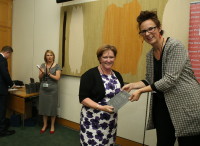 Veronica Snow is a registered nurse who has been responsible for managing the End of Life Care programme since 2009. The work seeks to improve end of life care in Wales through collaboration across all health sectors on matters of equity, fairness, peer review, user engagement and good governance.
Veronica Snow is a registered nurse who has been responsible for managing the End of Life Care programme since 2009. The work seeks to improve end of life care in Wales through collaboration across all health sectors on matters of equity, fairness, peer review, user engagement and good governance.
Her vision has resulted in the introduction of seven day working for Clinical Nurse Specialists throughout Wales and a far stronger relationship between voluntary and statutory providers.
Veronica’s commitment to improving palliative care provision has been longstanding. She was the Professional Lead for Palliative Care at the South Wales Cancer Network when the the first Palliative Care Needs Assessment was undertaken and also sat on the Palliative Care Review Group.
The colleague who nominated Veronica said: “As a well respected professional in both a clinical and strategic capacity, her ability to communicate strategic vision, build and sustain relationships across all sectors has created a platform to achieve beneficial change for all requiring End of Life Care.
As a district nurse in 1984, Veronica realised the importance of good quality end of life care, not only for patients, but on the health and well being of the whole family, enabling a normal grieving process to take place and allowing them to move on.
Since that time, Veronica has spent the last twenty years in both a clinical and strategic capacity as a passionate advocate for equitable access to good end of life care for all, wherever they reside. Bringing knowledge gained from clinical experience to influence change.
Improving the experience for dying patients and their families is her only goal, I can think of no one more deserving of this award.”
The Organisation Prize
TB Team – Homerton University Hospital
Winner
Homerton University Hospital’s TB Team is a nurse-led multidisciplinary team of seven working in the London Borough of Hackney, which has one of the highest rates of TB in the UK. They hold clinics and therapy service for patients at the hospital, while the rest of their work is community-based.
After the team observed the particular challenges faced by homeless patients and the risk of transmission to other homeless people, they realised they would continue to experience high levels of morbidity and mortality unless they could be housed. They worked with Hackney Council’s housing department to negotiate a service level agreement with them to ensure that all TB patients with no recourse to public funds are housed for the duration of their TB treatment.
The team said: “We have been together since 2009, and share congruent values in terms of the care that we want to deliver to our patients, especially those with complex needs and multiple morbidities.
The London Borough of Hackney is a densely populated, ethnically diverse area. Although Hackney has undergone rapid gentrification recently, there are still significant numbers of people living in deprivation and poverty, and the Borough still acts as a magnet to migrants both legal and undocumented, many of whom join hard to reach, socially excluded groups.
Reaching these groups has been a priority for our team, and our ethos is to take the services to them, in the form of outreach work on the streets, in the parks and wasteland, and in the various soup kitchens and other organisations which offer services to homeless people. However, once found and put on treatment, our team found that maintaining a homeless person on TB treatment posed other, major challenges which had to be overcome in order to cure these patients: their homelessness and no recourse to public funds.”
Click here to read more about the services offered by the TB Team.
Cwm Taf University Health Board and Unite
Finalist
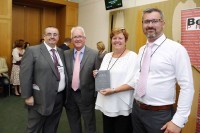 Cwm Taf University Health Board and Unite were nominated for their collaborative approach to achieving the health board’s motto ‘Cwm Taf Cares.’
Cwm Taf University Health Board and Unite were nominated for their collaborative approach to achieving the health board’s motto ‘Cwm Taf Cares.’
The health board’s branch of Unite entered into discussions with Dr Paul Davies, Assistant Director of Operations for Mental Health and CAMHS, about how they could work together to improve care for confused patients in the general hospital setting, while also improving the advice available to staff.
As a result of this, a booklet was developed entitled: ‘Caring for the Confused Person in Hospital: A Handbook for Carers’. It has been distributed to every registered nurse and health care assistant working in Cwm Taf UHB.
The team member who nominated them said: “Both Cwm Taf University Health Board and Unite Cwm Taf Health Branch were determined that they would work together in a spirit of partnership to create a resource for its staff that would benefit the patients being cared for in the general ward environment and in the community setting.
The impact for patients has been to significantly improve their experience and improve the outcomes of the care provided. The impact on staff has also been considerable, increasing their understanding on the causes and effects of confusion but increasing their satisfaction of being able to give the best possible care to all patients, thus reducing their stress and frustration in a highly pressurised working environment.”
The handbook is available to download here.
In It Together
Finalist
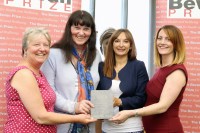 The ‘In It Together’ transgender awareness project began around two years ago when Public Health Wales’s Screening Engagement Team was approached by members of the transgender community with concerns about access to screening.
The ‘In It Together’ transgender awareness project began around two years ago when Public Health Wales’s Screening Engagement Team was approached by members of the transgender community with concerns about access to screening.
Transgender service users highlighted their mixed experiences of screening services, including confusion over who should be invited for screening and the poor availability of information and communication with services users.
The In It Together team recognised that this needed to be addressed and devised an action plan with the primary aim to improve the service provision for transgender people in Wales. They have worked alongside transgender service users and partners to improve service delivery and accessibility though a number of resources including leaflets, training and digital stories.
These resources were officially launched by Vaughan Gething AM, Deputy Health Minister, in October 2014 and were widely welcomed by service users and providers.
The team said: “Our work has had multiple benefits for service users and partners, as well as our organisation. It demonstrates excellent partnership working and adopts the fundamental principles of prudent healthcare which can only strengthen relationships between screening and transgender service users and partners.”
Learn more about the In It Together team here.
Media Academy Cardiff
Finalist
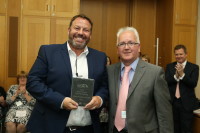 Media Academy Cardiff (MAC) is a charity providing a range of accessible services to young people who are vulnerable to exclusion from mainstream society.
Media Academy Cardiff (MAC) is a charity providing a range of accessible services to young people who are vulnerable to exclusion from mainstream society.
The team works with over 1500 young people every year, most of whom have specific health issues such as substance misuse issues, mental health needs, learning needs, obesity and smoking. They offer holistic education programmes for children excluded from school and those aged over 16.
They said: “For us, the ubiquitous term ‘holistic’ means education including access to counsellors, CAMHS workers and also substance misuse workers working with the teaching team to educate children and young people about health issues that may be adversely affecting their lives.”
MAC’s nomination specifically highlighted their ‘Parallel Lives’ programme, which seeks to combat adolescent against parent domestic violence.
The only programme of its type operating in South and Mid Wales, Parallel Lives receives referrals from a variety of partners including schools, South Wales Police and Youth Offending Teams.
The team said: “Child and adolescent against parent violence is an under-explored and complicated social and health care issue. Parallel Lives was developed as a result of a direct gap in provision for child against parent violence in South Wales.
It offers a comprehensive support programme to many families affected by child against parent violence and is not dependent on ability to pay as the service is free at the point of access. Participants are taught communication and anger-management techniques on the programme and substance misuse worker and counsellors are available to support participants.”
Read more about MAC and the Parallel Lives programme here.
Wellbeing Through Work
Finalist
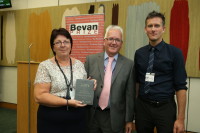 The Wellbeing Through Work team is a multi-disciplinary team working with individuals who are at risk of developing work limiting health conditions. They focus on helping people to remain in work by offering short-term early interventions, 80% of which are delivered via telephone support.
The Wellbeing Through Work team is a multi-disciplinary team working with individuals who are at risk of developing work limiting health conditions. They focus on helping people to remain in work by offering short-term early interventions, 80% of which are delivered via telephone support.
People can be referred to Wellbeing Through Work by their GPs, and local businesses are also able to refer their employees who are struggling to manage their health. It has had an observable impact on the local economy, as well as staff and patient wellbeing.
A member of the team said: “GPs have reported that the fast access has enabled them to signpost patients to the service, freeing up more of their consultation time. As the largest referral source, NHS staff has benefited by speedy access to evidence-based interventions and, ultimately, patients have benefited with more staff remaining in work to fulfil the objectives of the Health Board which employs over 16,000 staff.
“The success of the team has now come ‘full circle’ as Jobcentre Plus is purchasing services to support welfare claimants back to work and this is providing income generation that will help to sustain the team deliver the service to a wider population.
“The team also ‘role-models’ key concepts related to promoting health at work, with over 70% of team members undertaking flexible working patters to meet family and carer commitments or to aid work/life balance.”
Read more about Wellbeing Through Work here.
We are grateful for the support of our sponsors:
–

